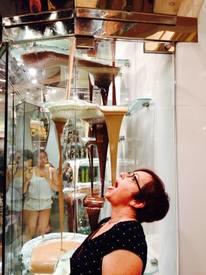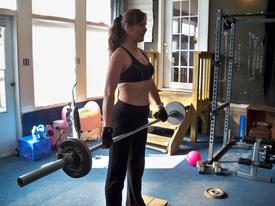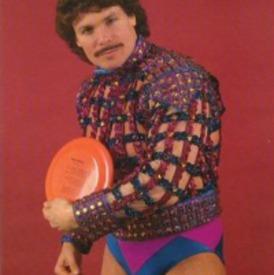This is horrifying...
Replies
-
I have read several articles lately about protein productions, now including this one. One says that labs will be able to grow enough meat to make a hamurger from stem cells of cows. This article talks about having chickens essentially without a brain. I assume if they were to successfully do this there is no reason to believe they couldn't do this to other protein sources, such as cows, pigs, etc. I don't know if that would be a good idea as who knows that the tickering with the genetics of the animal will do to the people that consumer it.
Another artticle stated that they will be able to come up with something that mimics meat and is completely plant based, but has a similar nutritional values and taste. The artciel went so far as to say that people wouldn't be able to tell the difference between meat and the faux meat product, even "foodies."
Sadly, as the world population grows there will have to be a solution, and it will probably be a combination fo everything above. I just wonder if we start growing meat in labs, and have brainless animals what will happen to all the real animals. Would the governments create vaults for their DNA similar to the seed vaults? Who knows.0 -
Honestly, I almost cried when I saw the picture of the brainless chickens. I think I prefer to occasionally eat an expensive, well treated chicken then to eat something like that. Just seems more natural and my gut reaction. I have been vegetarian off and on again, but now only eat poultry occasionally. The last cold I had while a vegetarian was a month long... I haven't been that sick since I lived in my parents house, who were 3 pack a day smokers.
Anyway, here's another interesting link. I wonder how many people will think more deeply about where their meat comes from when this stuff hits the market: http://en.wikipedia.org/wiki/In_vitro_meat0 -
How else are you going to feed a population of 6 billion and counting?But more horrifying than the current situation?
You decide...
http://www.wired.com/underwire/2012/02/headless-chicken-solution
Let's ask Dr Hannibal Lecter, he seemed legit in that documentary about the lambs or whatever...
Soilent Green is people!0 -
Now we can decide to create headless chickens and stomachless humans, or we can decide to limit the waste of resources and even population growth. Heck, "even" Chinese people have been doing it for years...
The logistics and draconian laws required to facilitate this are more horrifying to me than headless chickens.
I'm not too worried about the Earth. Ever visited an abandon ghost town? Remember, we will not destroy the Earth, the Earth will destroy us if we get to be too much trouble.
And if being mean to animals is your major concern, who do you stop other animals from from being mean to each other?0 -
[/quote]
You realize that if we take your argument that no one should eat meat to the entire Earthly population (7 billion), we're going to have to slaughter millions of animals to sustain ourselves as a society. We'll need way more farmland to support the increased vegetable consumption. Those animals whom your trying to protect will by definition become competition for our survival. I'm not against vegetarianism, nor veganism, but that's the logical flaw in the argument.
[/quote]
Growng vegetation also impacts the earth. Driving to work, living in a home, wanitng to wear clothes, the computer we use, all of it. Being a vegetarian and not being mean to animals does not solve a thing.0 -
How is it horrifying if these 'animals' have no sensory part to their brain? If they feel no pain, why would this be considered inhumane?
Sure, and if this works... let's put some humans on the line too. We could use them for surrogates for our babies and we could all have beautiful bodies! And then we could put some cows on there so they wouldn't have to graze the pastures. And then..... there's a moral boundary here somewhere.
Moral according to who? Also, a human brain is much more complex than a cow's or a chicken's. Not to mention there's already a large percentage of the population that's starving. Making a surrogate to have even more offspring seems counterproductive to what the goal of the original "headless chicken" experiment is.
Everything is greed and appearances. I'm not saying MORE humans. I'm saying women wouldn't have to take time off to have a baby or, in some cases, wreck the appearance of their body. And if someone actually came up with that technology, they would get rich. And.. what difference is it how complicated a brain is.. if it is removed? Just throwing in my 2 cents. Most people who are not psychopaths have a moral boundary.. somewhere.0 -
First, I'm not anti-vegan. But, what if the whole world's population decided to go vegan? Would there be enough space to raise veggies for 100% of the world's food? How much space *would* be required? Something to think about. Would we have to kill off all the cows and other animals we use for food, directly or indirectly?
It takes maybe an acre to raise a cow, right? That will give you several hundred pounds of meat (protein and fat) and nothing else (vitamins, minerals, carbs). You could feed a family of four by farming that same area and provide a balanced diet. Raising animals for food is less efficient, not more efficient (I'm not a vegetarian, btw). The most efficient way would be to raise the animals for the other things they can give us (milk, eggs, wool, etc.) and then eat them when their useful life is over. That, and goats can be raised on areas that aren't good for farming.0 -
Soylent Green. That is all.0
-
Literally made me feel sick. This is why I don't eat meat
 0
0 -
and how about this?
http://www.periscopepost.com/2012/02/dutch-scientist-prepares-to-unveil-worlds-first-artificial-meat-burger-cooked-by-heston-blumenthal/
im a meat eater, i choose to eat free range and organic where possible.
i refuse to eat at Halal restaurants.
i think we all need to stop trying to make more food, and start to stop people breeding for the sake of it.
We dont NEED families of 7-15 kids, why is it still allowed? i say there should be a limit on offspring, and also stop trying to solve aids in africa and start trying to educate the people to not have multiple babies one after another.
sorry if this is very right wing, but thats just who i am.0 -
How is that worse than breeding turkeys with breasts so large that they cannot stand up under their own weight?0
-
This article made me sad. I'm not a vegetarian, but own a few chickens. Life should be respected. Even if it isn't human life. You can eat meat and still be respectful of the animal it came from. Basically, the designer is trying to take the life out of the birds to produce the meat. I don't know if it's more humane, but anyone can look at it and see it's not natural. Zombie chicken vines.
Zombie chicken vines.:sad: :sad: :sad: :sad:0 -
I am not horrified.0
-
as long as the chicken breast ends up on my plate and eventually in my stomach, i dont care how it got there.0
-
This article made me sad. I'm not a vegetarian, but own a few chickens. Life should be respected. Even if it isn't human life. You can eat meat and still be respectful of the animal it came from. Basically, the designer is trying to take the life out of the birds to produce the meat. I don't know if it's more humane, but anyone can look at it and see it's not natural. Zombie chicken vines.
Zombie chicken vines.:sad: :sad: :sad: :sad: 0
0 -
my dreams are coming true0
-
That is not "humane" treatment at all. It's tampering with the natural order in a gruesome way, and justifying it in the name of human consumption. We eat meat, but we grow our own cows on pasture, and they live happy, healthy lives with other cows. I would never consider depriving them of that pleasure just so I would feel less guilty growing them in a way that isn't beneficial to them.
How much humanity are people willing to give up in their pursuit of selfish gains? There are better ways than creating brainless chickens for human consumption.0 -
First, I'm not anti-vegan. But, what if the whole world's population decided to go vegan? Would there be enough space to raise veggies for 100% of the world's food? How much space *would* be required? Something to think about. Would we have to kill off all the cows and other animals we use for food, directly or indirectly?
It takes maybe an acre to raise a cow, right? That will give you several hundred pounds of meat (protein and fat) and nothing else (vitamins, minerals, carbs). You could feed a family of four by farming that same area and provide a balanced diet. Raising animals for food is less efficient, not more efficient (I'm not a vegetarian, btw). The most efficient way would be to raise the animals for the other things they can give us (milk, eggs, wool, etc.) and then eat them when their useful life is over. That, and goats can be raised on areas that aren't good for farming.
Thanks for "doing the math" so to speak. This topic just got me thinking and I just threw out a few things that popped into my mind. I did look up and found a site that estimated, right now, there are about 2.59 acres of arable land per person on earth. Not sure if "arable land" means land that is already built on or just land in a climate that would support agriculture.0 -
6 billion, 7 billion, 8 billion, it doesn't matter. What does matter is the fact that huge population requires protein and yes the best protein comes from meat. It took millions of evolution that involved us being primarily meat eaters. Show me one study stating that "vegetarian diets (if properly done) are overall healthier than one that incorporates meat."
How else are you going to feed a population of 6 billion and counting?But more horrifying than the current situation?
You decide...
http://www.wired.com/underwire/2012/02/headless-chicken-solution
nonsense...
this is why i'm a vegetarian.. facts are, we dont feed 6billion (the number is closer to 7billion btw) people of the world. nearly 15% of the population is considered starving. i am not sure how many are considered mal nourished..there is a difference. many people in the US are malnourished yet overweight. facts are, animal farms, feed lots etc contribute to much of our pollution, clear cutting forests, erosion problems, poor soil quality. Facts are, a vegetarian diet is more sustainable for populations as well as the Earth. humans dont NEED meat to survive. in fact, vegetarian diets (if properly done) are overall healthier than one that incorporates meat.
I will wait.
Ha ha, yes, especially since there has never been a vegan or vegetarian society.......................However, there are societies that live almost completely off of animal sources because vegetation does not grow.
Most vegetarians and vegans are so misguided. SMH
Also, another thing to add is that growing all this subsidized corn, wheat, soy is what causes poor soil quality, not animals.0 -
Soylent Green. That is all.
:-)
Thanks. Never actually watched the movie.
And to the person who thinks there are no vitamins or minerals in beef ... Really???
I'm a vegetarian simply because I can no longer stomach the idea of eating an animal that has been killed. But I can still admit there is nutritional value to meat. I also freely accept that human being evolved to be omnivores and there's nothing inherantly wrong with eating meat. It's my personal choice not to.0 -
More chicken for me!0
-
Show me one study stating that "vegetarian diets (if properly done) are overall healthier than one that incorporates meat."
I will wait.
How about 3 that I found in a very simple database search through my local library?
http://www.mdpi.com/2072-6643/2/7/770/ (Open source document)
Nutritional Status of Flemish Vegetarians Compared with Non-Vegetarians: A Matched Samples Study
Peter Deriemaeker, Katrien Alewaeters, Marcel Hebbelinck,1Johan Lefevre,2 Renaat Philippaerts, and Peter Clarys
"Our results clearly indicate that a vegetarian diet can be adequate to sustain the nutritional demands to at least the same degree as that of omnivores. The intakes of the V subjects were closer to the recommendations for a healthy diet when compared to a group of well matched NV subjects."
Physical fitness and health-related parameters in vegetarian and omnivorous students
Clarys, P; Deriemaeker, P; Hebbelinck, M. Nutrition and Food Science30. 5 (2000): 243-249.
"We can conclude that, within the limits of our experimental population, a vegetarian food pattern can be considered as complete with intake of all required nutrients in sufficient amounts. Moreover, the vegetarian food pattern is closer to a healthy diet compared to the non-vegetarian diet. We found equally that the vegetarian subjects had similar physical performances compared to the non-vegetarian subjects. Finally, it was found that for some nutrients great discrepancies exist between food intake and blood concentrations, indicating that nutrient intake is not always directly linked with nutrient absorption."
Blood pressure and blood lipids among vegetarian, semivegetarian, and nonvegetarian African Americans
Melby, Christopher L; Toohey, M Lynn; Cebrick, Joan. The American Journal of Clinical Nutrition59. 1 (Jan 1994): 103.
"Blood pressure and serum lipids were compared among three dietary groups of Seventh-day Adventist African American adults: vegetarians, semivegetarians and nonvegetarians. A vegetarian diet was associated with lower cardiovascular disease risk factors than was an omnivorous diet."
"In summary, despite considerable dietary homogeneity among black Seventh-day Adventists, vegetarians exhibited lower WHRs, less HT, and lower concentrations of STC, LDL-C, triglycerides, STC/HDL-C, and LDL-C/HDL-C compared with nonvegetarians. Semivegetarians, who consumed one to three servings of flesh food per week, had blood lipid values intermediate to the vegetarians and nonvegetarians. The lower values for these CVD risk indicators in the vegetarians were related to less central-body-fat patterning, lower saturated fat intake, and a higher P-S ratio. These data indicate that the vegetarian diet is associated with lower values for important CVD risk factors among black Americans, and may afford some protection against development of premature CVD."0 -
How is it horrifying if these 'animals' have no sensory part to their brain? If they feel no pain, why would this be considered inhumane?
Sure, and if this works... let's put some humans on the line too. We could use them for surrogates for our babies and we could all have beautiful bodies! And then we could put some cows on there so they wouldn't have to graze the pastures. And then..... there's a moral boundary here somewhere.
Moral according to who? Also, a human brain is much more complex than a cow's or a chicken's. Not to mention there's already a large percentage of the population that's starving. Making a surrogate to have even more offspring seems counterproductive to what the goal of the original "headless chicken" experiment is.
Everything is greed and appearances. I'm not saying MORE humans. I'm saying women wouldn't have to take time off to have a baby or, in some cases, wreck the appearance of their body. And if someone actually came up with that technology, they would get rich. And.. what difference is it how complicated a brain is.. if it is removed? Just throwing in my 2 cents. Most people who are not psychopaths have a moral boundary.. somewhere.
You're treating morals as if they're objective though. Your morals are not everyone's morals. And the complexity of the brain matters because the more simple the brain of a creature is, the more certainty that they won't be feeling pain (as far as the contexts of this situation goes).0 -
We dont NEED families of 7-15 kids, why is it still allowed? i say there should be a limit on offspring, and also stop trying to solve aids in africa and start trying to educate the people to not have multiple babies one after another.
sorry if this is very right wing, but thats just who i am.
People like you frighten me.
And that's not right wing. That's Chinese law and China is leftist.0 -
First, I'm not anti-vegan. But, what if the whole world's population decided to go vegan? Would there be enough space to raise veggies for 100% of the world's food? How much space *would* be required? Something to think about. Would we have to kill off all the cows and other animals we use for food, directly or indirectly?
It takes maybe an acre to raise a cow, right? That will give you several hundred pounds of meat (protein and fat) and nothing else (vitamins, minerals, carbs). You could feed a family of four by farming that same area and provide a balanced diet. Raising animals for food is less efficient, not more efficient (I'm not a vegetarian, btw). The most efficient way would be to raise the animals for the other things they can give us (milk, eggs, wool, etc.) and then eat them when their useful life is over. That, and goats can be raised on areas that aren't good for farming.
I'd also like to add, if we wern't eating meat, we wouldn't be breeding animals at such a high rate. We wouldn't need to slaughter loads of them.0 -
I don't see why this is turning into a meat vs. no meat debate. That isn't what this is about. This is about whether this particular case is inhumane or not. People will always be eating meat. Deal with it.0
-
It's easy to cry out against the plight of the chickens and pledge to eat vegetarian or only well-treated, happy, free-range chickens. At least, it is when you're living in the first world and can afford to make that decision. If it was our babies who were starving or malnourished because we don't have the money or resources for an organic diet, our tune would change.
People have always been resistant to scientifically-induced change. The reality is, we have a lot of people on this planet, and we just can't live the way we did 100 years ago. We can't raise our own chickens, pigs and cows because we've been urbanized. We can't universally farm organic because it takes fertile space that just isn't available. It's all well and dandy to make efforts to buy organic, but that is a privilege reserved for the wealthy few. It's unfair for that few to make the decisions for the whole world.0 -
great now I want a McChicken sandwich. Thanks O.P.0
-
This is disgusting, that is what it is.
I am all for meat consumption, but it has to be from local farm raised sources. There is NO way in hell that I will ever eat chicken that has been massed produced like some boxed macaroni and cheese. And there is NO way that I will ever eat that cloned meat they are working on right now.
Cloned ground beef is supposed to be released in October or some time this year.
GROSS0 -
First, I'm not anti-vegan. But, what if the whole world's population decided to go vegan? Would there be enough space to raise veggies for 100% of the world's food? How much space *would* be required? Something to think about. Would we have to kill off all the cows and other animals we use for food, directly or indirectly?
It takes maybe an acre to raise a cow, right? That will give you several hundred pounds of meat (protein and fat) and nothing else (vitamins, minerals, carbs). You could feed a family of four by farming that same area and provide a balanced diet. Raising animals for food is less efficient, not more efficient (I'm not a vegetarian, btw). The most efficient way would be to raise the animals for the other things they can give us (milk, eggs, wool, etc.) and then eat them when their useful life is over. That, and goats can be raised on areas that aren't good for farming.
I'd also like to add, if we wern't eating meat, we wouldn't be breeding animals at such a high rate. We wouldn't need to slaughter loads of them.
maybe people should stop breeding at such a high rate? just sayin0
This discussion has been closed.
Categories
- All Categories
- 1.4M Health, Wellness and Goals
- 396.9K Introduce Yourself
- 44.2K Getting Started
- 260.9K Health and Weight Loss
- 176.3K Food and Nutrition
- 47.6K Recipes
- 232.8K Fitness and Exercise
- 453 Sleep, Mindfulness and Overall Wellness
- 6.5K Goal: Maintaining Weight
- 8.7K Goal: Gaining Weight and Body Building
- 153.3K Motivation and Support
- 8.3K Challenges
- 1.3K Debate Club
- 96.5K Chit-Chat
- 2.6K Fun and Games
- 4.5K MyFitnessPal Information
- 16 News and Announcements
- 18 MyFitnessPal Academy
- 1.4K Feature Suggestions and Ideas
- 3.1K MyFitnessPal Tech Support Questions
















